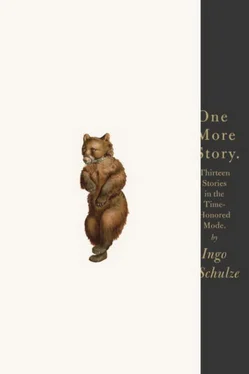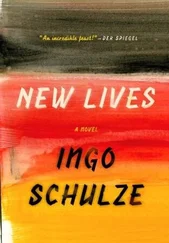You might take them for paratroopers if it weren’t for the “Border Guard” printed on their chests. I know what I have to do. Without a word the border guard assigned to me extends his hand for my passport, shifts his weight forward, and — with an imperceptible flick of the wrist of someone playing trumps — hands my passport back to me, as if he weren’t the right official, as if he didn’t even need to look at it. And now it’s the French family’s turn. “Bonjour,” the children say, the parents smile — it’s printed on the backs of the border guards as well, yellow on blue, “Border Guard.”
But what’s become of the customs agents?
In Györ there is a long freight train waiting on a siding, with cars labeled, “We’re doing the driving for Audi” or “We’re doing the driving for VW,” plus logos, brown and rusty as the cars themselves. A water tower in the background, UFO on its shaft. Customs really ought to be here by now.
I’ll tell Petra that in my story “Incident in Petersburg” my fear of having to pay for what I had written is the mirror image of my desire to live with a poet, and that I confused my love for her poems with my love for her, just as she confused love …
The first time I saw you reading your poems, I will say, I fell … But then I’ve told her a hundred times now how when she read her poems her face took on an entirely different look, like that of a young girl, and that when, between poems, she talked about the situation out of which the next poem had arisen — both the organizers and the public loved her for these stories — you believed she had just awoken and was shaking off a dream. And I was certain that everyone who saw and heard her had to fall in love with her. And yet I won’t confess to her this time either that I dreamed of being the intimate “you” in her poems. I didn’t want dedications — dedications are like thirteen-year-olds who smoke. You’ll see, I’ll say, rebutting each of her objections, I haven’t written anything that will hurt you. No, I won’t say that. What I’ve written is that everyone will want to move into your apartment, with its old hardwood floors that would do any museum proud, they’ll want to go strolling with you in Schönbrunn.
In my “Incident in Petersburg,” the reminiscences awakened by the burning car are followed by a depiction of the scene that took place only twenty-four hours before. I was on the phone with my father, and while searching for pencil and paper to write down his telephone number in the rehab clinic, I wandered into Petra’s room with its wide floorboards and old windowpanes (“can’t find those anywhere but Vienna”). Petra looked up, reproachfully, angrily, because I had torn her away from her poem or because I still had on her bathrobe, which was much too small for me. I looked just as reproachfully back at her, because she needed to understand that I had to find a pencil quick, and because she managed to run around in nothing but baggy pants, sweat pants, gym pants, jogging pants — clothes even a lousy soap-opera scriptwriter can come up with if he wants to denigrate a character. Only someone aware of the increasingly long intervals between our meetings would understand these mutual reproaches. Petra and I were just no match for all the running around, the earning-your-daily-bread reading tours, not to mention the constant back-and-forth between Berlin and Vienna.
Why shouldn’t I be able to write about this? What if a few people guess whom I mean by Petra or Katja? Take the statement that it’s better to buy a chicken in Vienna than Berlin, since chickens in Vienna still have their claws on, and the claws tell you if a chicken has actually scratched around in a chicken yard — do I have to approve of such statements, even if they’re yours? I don’t claim you’re to blame for my mugging. Of course, a person can always be a little to blame somehow.
Silence. As if someone has pulled the plug, the heater stops rumbling, all noises cease, the train starts to roll again, almost soundlessly, a few hundred meters, puts on the brakes — Hegyeshalom. Pansies in concrete buckets. Hegyeshalom, border station. Hegyeshalom! I close my eyes, picture myself at the end of the world, and finally I get it: There are no customs agents at Hegyeshalom anymore.
“It would probably be good for both of us,” Petra said, “if we don’t see each other for a while.” That was the end, the separation, I understood at once. And I also understood how pointless it was to protest. She made our farewell so easy! No arguments, no recriminations, just this “don’t see each other for a while.” How drunk I was with this unexpected freedom, and how stunned that it was all over between us.
Our stop in Hegyeshalom — there are no customs agents now — lasts three minutes. The heater rumbles on again, the train pulls out, rolls over the border. The free son of a free country, I feel nothing, my soul does not soar in jubilation.
An hour later the EC 24 pulls into Vienna West Station, on time, platform 7. With a blue folder and an empty bottle in my shoulder bag, I wait until others have boarded. I wait until the platform is almost deserted. I know what it looks like when Petra — or would it be better to call her Katja after all — hurries toward me with long strides, breaks into a run for the last few yards, and raises her shoulders just before she hugs me.
At ten to one, I walk through the entrance building of the Museum Quarter, a passage that reminds me of hospitals and barracks and worse. Abandon all hope. As for what I’m going to say to Katja, I’m even less sure now than I was when I started out. Besides, I still have that song from the taxi running through my head—“And all the bells are scolding.… It was a lovely day.…” I know, it’s not “scolding,” or “lovely” either, but I can’t help it.
In fact I feel ridiculous with my blue folder in my bag. Yes, I feel like an infant — as if I’m overtaxing my abilities to choose a destination myself, as if I can maintain my composure only if I’ve been invited, asked to give a performance, with follow-up questions. I’m standing in the middle of the courtyard of the Museum Quarter. I have no idea what there is to see here. My cell phone buzzes a message. For a brief moment I hope I’ll be able to escape my meeting with Petra or Katja. T-Mobile bids me welcome to Austria.
When I look up I see Katja in the middle of the entrance. We smile and look to one side or at the ground, then our eyes meet again. She has short hair, her hands are in her coat pockets, she has gained weight. We kiss each other on the cheeks, like old friends. “Servus , my dear,” she says. “You look tired.”
Katja climbs a set of steps ahead of me, I follow and watch the hem of her coat above the hollows of her knees, her calves, the red spots on her heels left by her old-fashioned pumps. “Here?” she asks, as if I had made a suggestion. I nod. El Museo, it’s almost empty, a kind of IKEA restaurant. Katja opens her coat, I reach to help her out of it. Katja is pregnant. She smiles. I congratulate her. I am seething with jealousy, there is no love in me. We sit down.
I want to ask her who the father is. I bend down and extract the blue folder from my bag. I feel like a subpoena server who is not about to be derailed by sociability.
“So why are you in Budapest?”
The waitress and waiter look like brother and sister filling in for their parents on Sunday. They are both pudgy in the same sort of way, she’s a blond, his hair is black, his round head reminds me of a mole.
I hear myself say Esterházy.
“Oh, you mean Péter?” she says with a smile and lays a hand on her belly. So they know each other. I should have known. Of course they know each other. He’s probably had her give him a massage. There is no love in me.
Читать дальше












